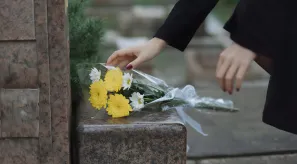The cremation certificate is a very important document for families when a loved one dies. Find out with Stelae what it is for and how to obtain it.
What is the cremation certificate?
The cremation certificate is a document that is issued after the cremation of a deceased person. It is essential for families to have in order to carry out certain procedures.
Together with the ashes of the deceased, relatives are also given the cremation certificate as a way of identifying their deceased relative.
According to Spanish law, obtaining this certificate is obligatory in order to carry out certain subsequent formalities, as we will see below.
Why is the cremation certificate important?
The cremation certificate is an official document issued by the relevant authorities, such as the Civil Registry or a health department.
This document also serves as a certificate of inhumation, as it certifies that the legal and sanitary regulations have been complied with to be able to proceed with the burial of a deceased person.
The certificate is particularly important because it is needed in order to obtain permission to bury the ashes of a loved one in a cemetery or to transfer them to another country, as the case may be.
Spanish regulations require this document to be obtained in order to obtain a burial licence in a cemetery.
What are the necessary requirements to obtain the cremation certificate?
One of the procedures after the death of a relative is to obtain the cremation certificate, a document which, as we have seen, is essential in order to be able to bury ashes in a cemetery or transfer them to another country. What are the requirements to obtain this certificate?
Documentation required from relatives
To obtain the cremation certificate it is necessary to provide the death certificate of the deceased. This procedure takes place at the Civil Registry Office, but it can also be handled by the funeral company which usually can take care of procedures such as this.
When a loved one dies, the death certificate is essential for many other procedures, which is why obtaining it is a service that is usually provided to families.
Family members must also give their express consent to the cremation of a loved one in order for this to be recorded on the death certificate and, for this purpose, the ID card of the deceased person and that of the person requesting the cremation must also be provided.
Legal authorisation and permits for the cremation
To be able to bury the ashes of a loved one in the cemetery, first it is necessary to obtain authorisation. In order to obtain this burial permit, the cremation certificate, which the funeral company gives to the relatives together with the ashes of their loved one, must be provided.
In addition, the death certificate and, in some cases, the last will and testament certifying that the deceased person wished to be cremated must also be provided.
Under no circumstances may the ashes of a deceased person be buried or transferred without the appropriate legal authorisation to do so.
Timescales and procedures for issuing the certificate
If the family wishes to bury the ashes of their loved one in a cemetery, they must first make the necessary arrangements with the local council or with the company that manages the cemetery in question.
To obtain this authorisation, documents such as the death certificate are required, a procedure that can be carried out 24 hours after the death of our loved one.
With this document, the cremation certificate can then be obtained, followed by the burial licence. Therefore, given that the law stipulates that at least 24 hours must have passed before a deceased person can be buried, and the maximum time limit for doing so is 48 hours, this is the time limit for issuing the cremation certificate, under normal conditions.
How can the cremation certificate be requested?
Generally, it is the funeral company that gives the cremation certificate to the relatives, accompanied by the urn with the ashes of their family member and an identification.
This document certifies that the legal and sanitary conditions for burying or transferring the ashes have been met, which is why it is a service included among the rest of the funeral services contracted.
In the event that this certificate is not provided, it should be requested from the company that carried out the cremation of our loved one.
Is it compulsory to have a cremation certificate for the process?
The cremation certificate is required for the burial or transfer of ashes. In these cases, therefore, it is mandatory.
It does not hurt to have this document - although in principle it is not necessary - if you are keeping your loved one's ashes at home or scattering them on private property. However, it may be required if your intention is to obtain authorisation to scatter your loved one's ashes in another place.



